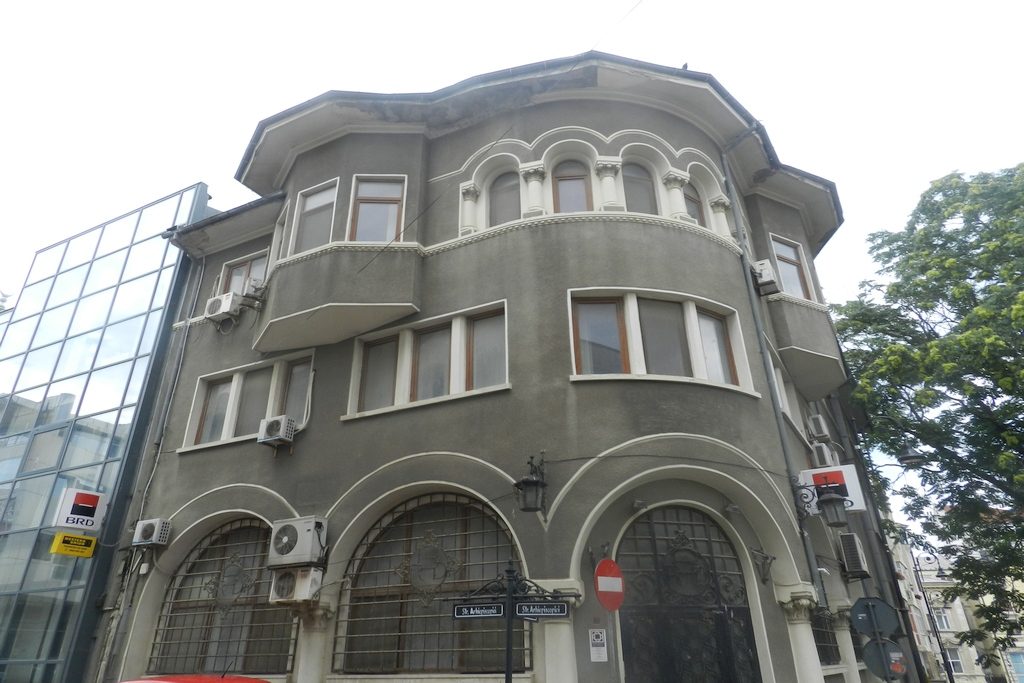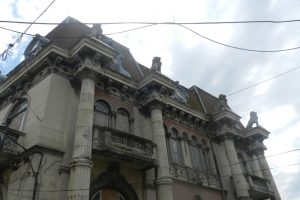

The bank from the Arhiepiscopiei street from Constanța is a building situated on the list of historical monuments. This was built in the period 1920 – 1930.
The first banks built in Constanța were the Bank of Commerce, the Bank of Industries and of Occupations from Dobrogea and the Bank of Discounts.
Constanța was founded following the Greek colonization of the basin of the Black Sea (the Greek Pontus Euxeinos) by the Milesian colonists in the centuries VII – V b. Chr., under the name of Tomis. This name is probably derived from the Greek word “tomi” which means cutting, splitting. According to the legend, Iason and his Argonauts would have lodged after they had been sent in Caucasus to steel “The Golden Wool”. Followed by the fleet of the king of Colhida, Aietes “the Hawk”, would have cut into pieces his son, Absyrtos, until then being held hostage at the board, in order to obligate the King to search and to gather the relics for the funeral ceremony, giving in this way to the Argonauts the necessary time to run towards Bosphorus. But the archeologists consider more plausible that the cutting (from the line of the shore) to designate, more likely, the ancient port, today submerged, in front of the Casino. Another possible origin of the name would have been Tomiris, Queen of the Massagetae, a Getae tribe which lived between the Black Sea and the Caspian Sea (Herodotus).
The Milesians arrived on these places on a Getae establishment, the new city reaching to a level of a polis only in the IVth – IIIrd century b. Chr. The port used by the Greeks for the commerce with the inhabitants from these regions (Dacians, Scythians and Celts) allowed the development of an urban center. Tomis became a part of the Roman Empire in the year 46, being renamed Constantiana. Publus Ovidius Naso, the Roman poet, found his exile between the years 8 – 17 A.D. and he spent in Constantiana his last eight years of his life.
The city endured the troubled times from the IIIrd and from the IVth century, distressed by the numerous Gothic, Scythian and Hunnish invasions, becoming the residence of the province Scythia Minor (the Latin Scithia Minor, Greek Mikrá Skithía). After the dividing of the Roman Empire, Constanța together with the entire Scythia Minor, was redeemed to the Eastern Empire and remained part of it until the VIIth century, when it was lost due to the migrations of the Slaves and Proto – Bulgarians.
Constanța is the residence of the county with the same name. The county of Constanța is the most urbanized county from Romania. The population who lives in the cities numbers 539.902 inhabitants, they living in the three municipalities (Constanța, Medgidia and Mangalia) and nine cities (Băneasa, Cernavodă, Eforie, Hârșova, Murfatlar, Năvodari, Negru Vodă, Ovidiu and Techirghiol). Besides the urban areas, it is also composed by 58 communes. It has a population of 756.053 inhabitants and a surface of 7.071,29 km2, it is situated on the 5th place according to the population and on the 7th place according to the surface among the country’s counties. It is bordered on with Bulgaria, the county Călărași, the county Ialomița, the county Brăila, the county Tulcea and the Black Sea. The county of Constanța is, together with the county Timiș, situated on the first place among the counties regarding the contribution to Romania’s PIB, namely 17, 4 billion RON each.

